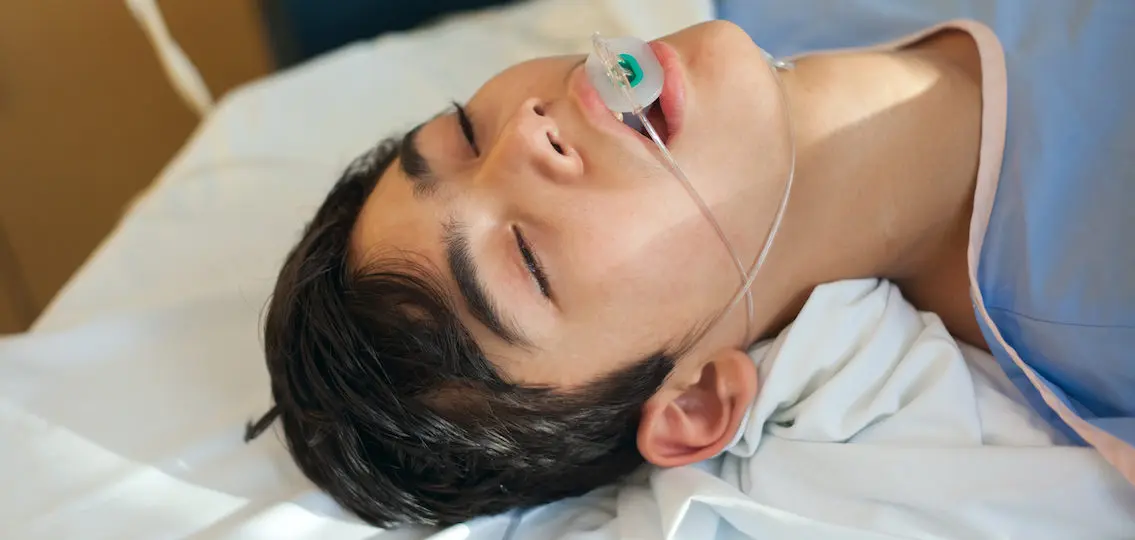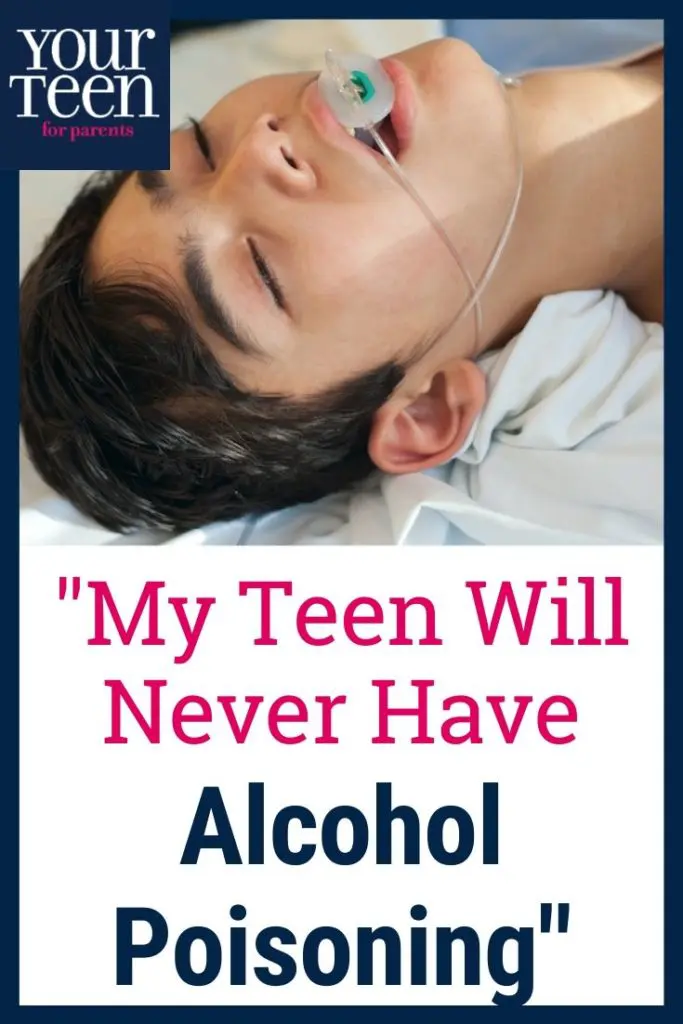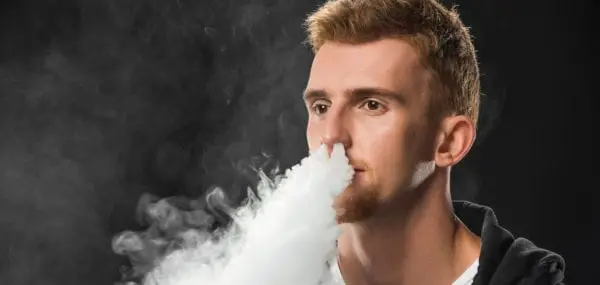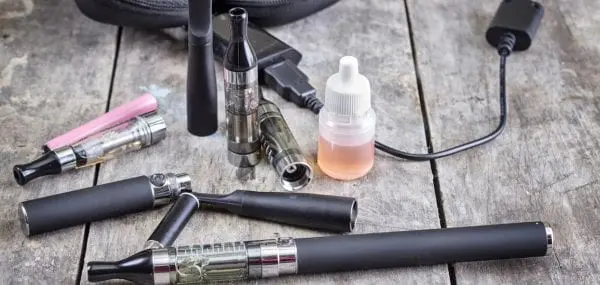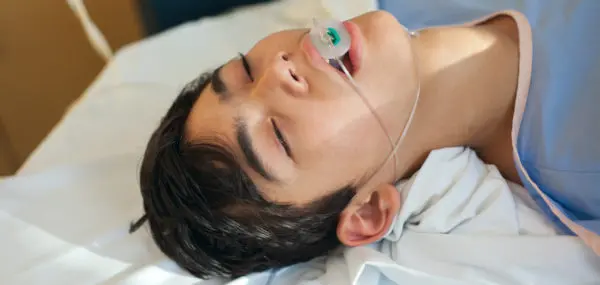Three years ago, I had just crawled into bed after a celebratory date on New Year’s Eve when I noticed a new voicemail alert on my phone. The Caller ID said “Unknown.” My heart sunk as I listened to the voicemail. “This is the Kirkland police. Your son, Trent Adams, is in the emergency room at Evergreen Hospital with alcohol poisoning. We need you to go there right away.”

The Hospital
I threw on a pair of sweats and ran downstairs to wake up my oldest son to drive me to the hospital. My son’s dad was in Arizona on vacation. I called him on the way to the hospital and left a message to let him know I would update him when I knew more. At the hospital, the nurse walked me to the room, saying, “Trent’s unconscious from alcohol poisoning. Some of his friends drove him to one of their houses and the parents called 911. At this point, all we can do is wait and see how he does.”
Trent was 15 and a half, a sophomore in high school, and small for his age at 5’4” and 102 pounds. His blonde hair and baby face give him an all-American-boy look. He’s bright, applies himself in school, and has never had any run-ins with the police.
Lying there in a hospital bed, his face radiated an angelic innocence. But the half-dozen wires extending from his chest to the upright monitor displaying his vital signs behind him said otherwise. He looked like he was resting peacefully, but I was painfully aware that his body was under siege.
His blood alcohol level was .19—almost two and a half times our state’s legal limit.
The Waiting
It was 2:30 a.m. and I was sitting in a hard, plastic chair Googling “alcohol poisoning” and reading everything I could find. Suddenly, I was startled by red flashing lights and a high-pitched “beeep, beeep, beeep” blaring from Trent’s monitor.
I whipped around to look at the display. I had no idea what the numbers meant, but they were plummeting! Two nurses rushed in and one of them pulled the covers off Trent’s chest. He pressed Trent’s sternum hard with his tightly clenched fist and rolled his knuckles back and forth like you would if you were giving someone a noogie.
He shouted in Trent’s ear, “Trent, hey buddy, wake up! You need to breathe. Come on, Trent, breathe!”
Trent’s mouth opened as his chest rose up and he gulped a life-saving breath of air. The alarm stopped. My older son and I exchanged a glance of relief.
A Long Night
Trent finally regained consciousness around 6:30 a.m. the next morning.
The nurse leaned over close to his face. “Do you remember having too much to drink last night?”
Looking over at me with complete sincerity (he wasn’t coherent enough to be acting), he pushed out a hoarse, “No,” while adamantly shaking his head.
Then the nurse said, “You don’t remember being egged on to chug some vodka?”
Trent’s cheeks flushed like he was trying to outrun a tsunami of bad memories. He whispered, “Yes. I remember.”
By 8 a.m., I signed the discharge papers and we were on our way home.
My next steps were going to require a thoughtfully planned response. I tried to remember that I was also a teenager once. My goal was to teach, not to shame.
Biting my Tongue
I pushed my fear and disappointment aside and tucked Trent into bed.
Kindly, I said, “I love you. I’m glad you’re going to be okay and we will talk about this tomorrow. I’ll check on you in a while.”
I felt disillusioned. I was afraid for Trent’s future and momentarily ashamed for what I must have done wrong as his mother. But I caught myself. I hadn’t done anything wrong.
Delaying Consequences
I didn’t need to lay down the law right away. But I knew, no matter what the consequence, I had to be 100 percent committed to following through. I was the parent, so I had to discipline like a parent. Not a best friend.
If I deviated from the consequences, or got lax on the rules, or let myself be broken down by relentless renegotiation, it wouldn’t work. Discipline takes effort. I think it’s the hardest part of parenting.
Learning rather than lecturing.
I’ve learned that it’s okay to include my kids in determining the consequences of their actions.
Some of Trent’s suggestions were tougher than mine. He jumped straight to the trifecta: losing use of his car and phone, and a complete restriction from his friends.
I didn’t restrict his car or phone, or take too much time from his friends. They’re most teenagers’ lifelines. I wasn’t interested in killing his spirit, I wanted to teach him a lesson.
We agreed on seven “active consequences:”
Consequences for Underage Drinking
1. Write an apology letter and deliver it in person.
Trent wrote notes apologizing to his friends and thanking them for getting him to help. He also wrote a letter to his friend’s parents who called the paramedics.
A few nights later, Trent apologized in person and delivered the cards he’d written. I also shared my deep gratitude.
His friend’s mom and dad reassured Trent that he was still welcome in their home. They didn’t sugarcoat how terribly scary it was to see him completely unresponsive.
His friend’s mom encouragingly said, “Trent, the measure of a man’s character is not the mistakes he makes but whether or not he learns from them. We have faith you’ll make very different decisions in the future. We love you, honey.”
2. Talk with a police officer.
A few weeks later, Trent and I visited with a police officer. The officer ran through several scenarios about what happens to teens who are caught with drugs or alcohol.
It makes sense to talk through potential worst-case scenarios before our kids encounter them. It’s possible they’ll avoid doing something they may regret later. The statistics are alarming. The Centers for Disease Control reports there are over 4,300 alcohol related teen deaths in the US each year. But an adolescent’s brain is still developing and teens don’t have the neural wiring yet to always think before they act and consider the consequences of dangerous or inappropriate behavior.
3. Contact the school administration.
Every school district is different, but our high school has a zero-tolerance policy for drugs and alcohol. The first violation carries a penalty of suspension from participating in any sport for the rest of the season and into the next. If a student completes a drug and alcohol evaluation and attends a four-hour drug and alcohol awareness class, the athlete can seek reinstatement after two weeks. A second violation and the student is ineligible to participate for an entire year.
Trent opted for the professional evaluation and attended the informative class. He was back playing lacrosse after two weeks.
4. Get counseling.
I let Trent know that I wanted him to have eight counseling sessions. I explained (even though he had heard it before) that this is a gift of love, not punishment. If he didn’t hit it off with the first counselor, we would try another until he found someone he liked. Trent had the final word.
For parents who don’t have health insurance, there are alternatives for support. Check with your school counselors, other parents, your pediatrician, a local children’s hospital, nonprofit organizations like NAMI (National Alliance on Mental Illness), and private parenting Facebook groups.
5. Serve the homeless.
One Tuesday night from 7:00 p.m.–1:30 a.m., Trent and I hit the streets with a group of other volunteers. Twelve of us split up between two vans. We made six stops at various locations throughout downtown Seattle. Trent helped one homeless man put up his tent.
We hiked up under the freeway hollering, “Search and rescue! We have hot chocolate, food, clothes, and warm blankets!” At one point, we witnessed one young man waving a lighter under a spoon, cooking up heroin before injecting it in his arm. It might have been a harsh field trip, but I believe it was appropriate with a history of addiction plaguing both sides of our family. If Trent thought he was old enough to drink, then he was old enough to see where a life of drugs and alcohol may lead.
6. Attend an open AA meeting.
When I was 18, I attended my first Alcoholics Anonymous (AA) meeting. I was there for moral support, but it felt like the whole meeting was speaking to me.
The principles that AA and other 12-step programs are foundationally solid. The steps can be simply translated to: How to Live a Good Life.
Trent and I attended a meeting close to home. Typically, if I take the boys to a program at school or church, Trent is the one wiggling in his seat. In this meeting, Trent sat motionless for 90 minutes. He was 100 percent focused on every person who spoke. It was like watching a sponge absorb water.
AA meetings are like free therapy and donations are encouraged, but optional. I wanted Trent to know about an amazing resource that will always be there if he ever needs it for any reason.
7. Paying 100 percent of the bill.
I should not pay for my child’s mistake. Whooping it up on New Year’s Eve resulted in a whopping $1,956.81 bill. This included the ambulance ride, hospital bill, deductible, lab work, an alcohol assessment, and the drug and alcohol class.
Trent got his first job and, slowly but surely, he chipped away at his debt. It took him a year to pay it off.
Counseling was a freebie. Though Trent’s father and I weren’t in agreement on every aspect of our course of action, we were in alignment when it came to counseling and covered Trent’s co-pay as our gift.
Hindsight is 20/20
We didn’t tackle this list in one week. It played out over several months, but it was worth it. Trent is now a freshman in college. We’ve talked about how it could have been fatal if his friends had left him alone, and he’s already taken one unconscious fraternity brother to the ER.

I hope no parent ever finds themselves in the situation I was in that New Year’s Eve three years ago. I certainly never thought I would be there. But my hope is that some of these suggestions will help another parent and their teen make it through to the other side.
